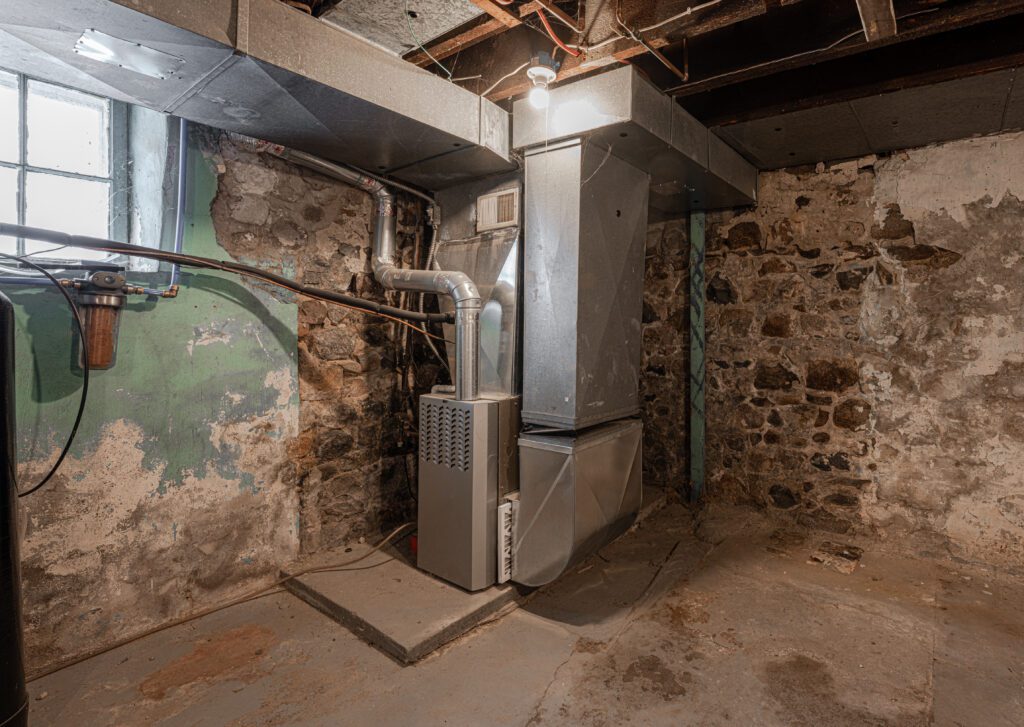

As winter approaches and temperatures continue to drop, it’s important to ensure that your heating system is up to the task of keeping you and your family warm and cozy. One of the key factors in determining the efficiency and effectiveness of your furnace is its size. But with so many options available, it can be overwhelming to figure out the proper size for your specific home. In this blog post, we’ll take the guesswork out of heating by discussing the factors that go into determining the right furnace size for your home.
Having the correct size furnace for your home is crucial for maintaining a comfortable and energy-efficient living environment. Many homeowners overlook the importance of correct furnace sizing, but it can have a significant impact on your heating system’s performance and your overall comfort.

Having the correct size furnace for your home, no matter its condition, is critical for maintaining a comfortable and energy-efficient living environment.
A furnace that is too small for your home will struggle to keep up with the demand for heat, leading to uneven heating and cold spots. It will constantly run, trying to meet the thermostat’s set temperature, which will result in increased energy consumption and higher utility bills. On the other hand, a furnace that is too large for your home will cycle on and off frequently, leading to short-cycling. This not only wastes energy, but also puts unnecessary strain on the system, shortening its lifespan.
Proper furnace sizing considers several factors, including the size of your home, the climate in your area, the insulation levels in your home, and the number of windows and doors. All these factors affect the heat loss and gain in your home, which determines the furnace size needed to maintain a comfortable temperature.
Let’s explore these factors more closely in the next section.
Determining the proper furnace size for your home involves considering several key factors. As mentioned, one of the primary factors to consider is the square footage of your home. A larger home will require a larger furnace to effectively heat all areas of the house. On the other hand, a smaller home will typically require a smaller furnace.
Another important factor is the layout of your home. Homes with open floor plans, for example, may have different heating requirements compared to homes with multiple rooms and closed-off spaces. The layout can affect how heat is distributed throughout the home, and therefore impact the size of the furnace needed.

The heating requirements of a home with an open floor plan will vary significantly from those with multiple rooms and partially restricted spaces.
The insulation levels in your home also play a crucial role in determining furnace size. Proper insulation helps retain heat and prevents it from escaping, which can reduce the heating load on your furnace. If your home is well-insulated, you may be able to install a smaller furnace.
Additionally, the number of windows and doors in your home can also affect furnace sizing. Windows and doors can contribute to heat loss, especially if they are older or poorly sealed. Homes with many windows and doors may require a larger furnace to compensate for the potential heat loss.
Finally, the climate should be taken into account. Connecticut-based homeowners, for example, commonly experience cold winters, so your furnace needs to be appropriately sized to handle the greater demand for heat during these colder months.
Now that we are familiar with the factors that affect furnace sizing, let’s dive into the details—and some basic mathematics.
Determining the proper furnace size for your home involves a calculation known as British Thermal Units (BTU). BTU is a unit of measurement used to determine the heating capacity needed to keep your home warm and comfortable. By calculating your heating needs using BTU, you can ensure that your furnace is appropriately sized to meet the demands of your specific space.
To calculate your heating needs, start by determining the square footage of your home. This can be done by measuring the length and width of each room and multiplying them together. Add up the square footage of all the rooms in your home to get the total square footage.
Once you have determined your home’s total square footage, it’s important to choose a furnace within that range that best meets your needs. Remember, selecting a furnace that is too small will result in inadequate heating, while a furnace that is too large will waste energy and put unnecessary strain on the system. Using a simple online calculator, such as this one, will enable you to make an informed decision.
With all your data and details in tow, when it comes to finalizing the decision to buy a proper furnace for your home, it’s always a good idea to seek outside help. These professionals have the knowledge and expertise to accurately assess your home’s specific requirements beyond what you previously calculated, ultimately recommending the right furnace size for optimal performance and efficiency.
So, don’t let the guesswork of furnace sizing leave you in the cold. Seek professional assistance and ensure that you have the right furnace size for your home. With their expertise, you can have peace of mind knowing that your heating system will keep you and your family warm and cozy all winter long. Contact us today!